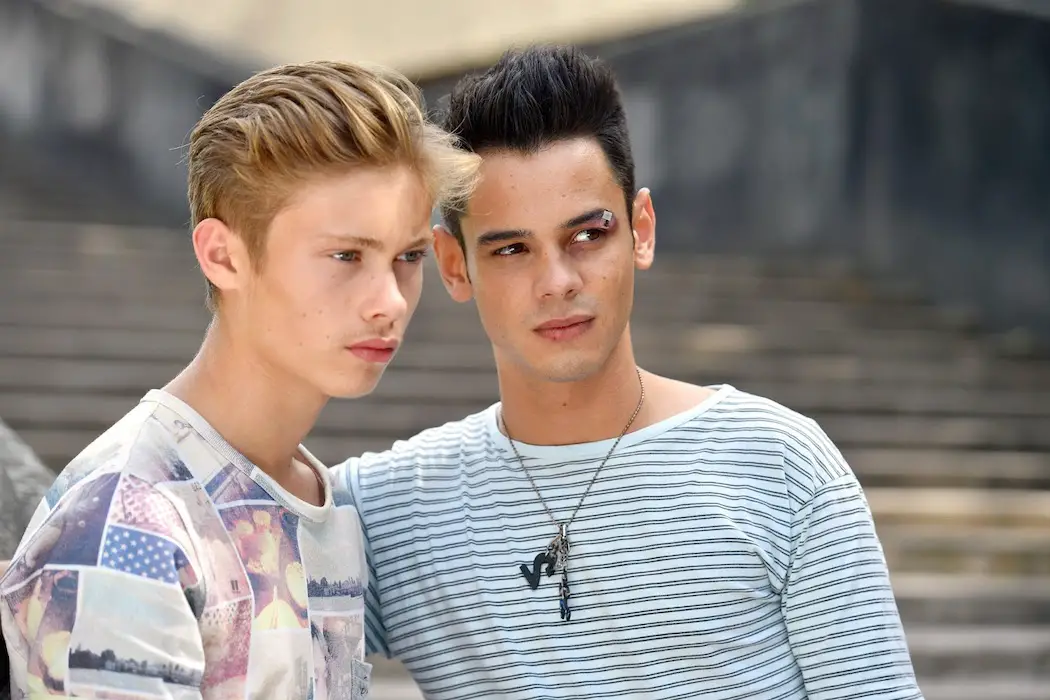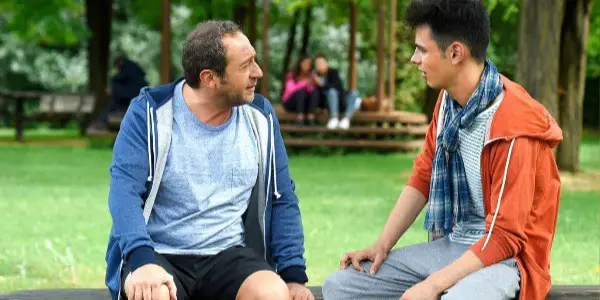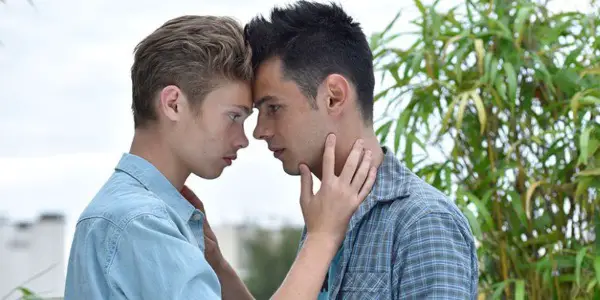Queerly Ever After #63: HIDDEN KISSES (2016)

Amanda Jane Stern is an actress, writer, and director from…
Queerly Ever After is a bi-monthly column where I take a look at LGBT+ films that gave their characters a romantic happily-ever-after. There will be spoilers. Also, don’t forget to buy your Queerly Ever After merch right here.
After a photograph of 16-year-old Nathan (Bérenger Anceaux) kissing another boy, whose face is obscured, at a party gets posted online, he finds himself the target of vicious bullying and harassment from his peers. Hidden Kisses is a French made-for-tv movie that ended up getting a wider release. Like many other made-for-tv movies in this column, it’s an issue piece about tolerance. As a film, it is a well-acted, well-crafted movie, but I couldn’t escape feeling that it was a little overdramatic given that it came out in 2016. I’m not saying homophobia isn’t extreme still in certain areas, but this movie is set in a sizable French suburb, and France legalized marriage equality in 2013, the fact that none of the students in this pretty large school have seemingly never met another LGBTQ+ person until now is a little hard to believe.

It is not only his fellow students who take issue with his sexuality, but Nathan’s own father, police captain Stéphane (Patrick Timsit), finds himself having a hard time accepting his son’s sexuality. The father-son pair who were formerly very close start to drift apart as Stéphane comes to terms with the truth. It isn’t until Nathan gets badly beaten up by a group of his fellow classmates, including the other boy from the photo, Louis (Jules Houplain), that Stéphane realizes he needs to support his son. Now, does Stéphane ultimately come around? Yes, but I’m sorry, it should not take your child being viciously attacked for that to happen. Also, his sexuality is not about you, grow up already and accept your kid.
The Do-Nothing Adults
Nathan’s classmates are a real group of cretins, but I can’t say the adults are much better. Closeted math teacher Catherine (Catherine Jacob) refuses to say anything to the students for fear of outing herself. As she says to the only teacher who tries to do something from the get-go, Tristan (Nicolas Carpentier), school was hell for her, Nathan will get over it. Not to be outdone, the school headmaster refuses to do anything about the bullying for fear of retribution from allegedly conservative parents. Again, this movie is set in 2016, just imagine the extreme backlash that would happen were Nathan to take to one of the multitudes of social media sites at his disposal and post about what’s going on and his school’s refusal to do anything about it.

Homophobia was still alive and well in 2016, it still is today, but in a place like where this is set, it tends to be more microaggressions, alienation, not violently pummeling the gay kid in the school locker room and facing zero repercussions. I was waiting for Stéphane to swoop in with his police badge and start arresting the lot of them, school headmaster as well. For reference, another French made-for-tv LGBTQ+ issue movie that I covered in this column, You’ll Get Over It, came out in 2002 and is set in a similar locale to this movie, but the homophobia that the outed kid faced feels more true-to-life for its time than it does here.
The adults at school are not the only garbage adults, no that award has to go to Louis’ dad, the disciplinarian Bruno (Bruno Putzulu). After Louis takes part in beating up Nathan at school, he tries to make amends, but Nathan refuses to talk to him. Then, Bruno discovers gay porn on Louis’ computer and that he has been incessantly calling and texting Nathan, and all hell breaks loose at home. Bruno, who still operates under the assumption that you can become gay by being in close proximity to a gay person (Bruno is a doctor by the way), takes away Louis’ phone and laptop and alienates him from the family. Louis is forced to eat alone in the kitchen and his parents refuse to talk to him.

After Louis runs away from home and contemplates committing suicide (he is saved by Nathan and Stéphane), does Louis’ mother Corinne (Barbara Schulz) realize that what she is allowing Bruno to do is wrong. She packs a bag, takes Louis and his younger brother and leaves, threatening to call child protective services on Bruno if he tries to stop them. Congrats on finally growing a heart lady.
In Conclusion: Hidden Kisses
Hidden Kisses is definitely an issue movie, more about the ills of homophobia than the romance between its two leads. At the end of the day, I do actually like the movie, I think it was very well done and the acting was superb. I just also think it felt a little outdated. Reading through lots of other comments and reviews of the film, I’m not alone in feeling this way. The fact that none of the students ever actually faced any consequences, and neither did the adults who sat back and did nothing really bothered me. If you’re gonna give me an issue movie where the homophobes are this virulently awful, I want some retribution. I’m not saying I want some external force to come in and go all slasher on the homophobes and wet-blanket adults, but I want to see them actually face consequences.
Hidden Kisses was written by Jérôme Larcher, and directed by Didier Bivel. For all release date info, see here.
Watch Hidden Kisses
Does content like this matter to you?
Become a Member and support film journalism. Unlock access to all of Film Inquiry`s great articles. Join a community of like-minded readers who are passionate about cinema - get access to our private members Network, give back to independent filmmakers, and more.
Amanda Jane Stern is an actress, writer, and director from New York City. She received her BA in Film, Television & Interactive Media and Theater Arts from Brandeis University. She loves regaling whomever will listen with her endless lists of fun facts and knowledge of film history. Follow her on twitter and instagram @amandajanestern













